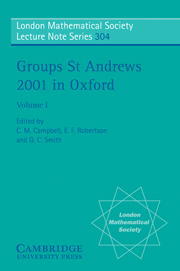Book contents
- Frontmatter
- Contents
- Contents of Volume 2
- Introduction
- Permutability and subnormality in finite groups
- (Pro)-finite and (topologically) locally finite groups with a CC-subgroup
- Table algebras generated by elements of small degrees
- Subgroups which are a union of a given number of conjugacy classes
- Some results on finite factorized groups
- On nilpotent-like Fitting formations
- Locally finite groups with min-p for all primes p
- Quasi-permutation representations of 2-groups of class 2 with cyclic centre
- Groups acting on bordered Klein surfaces with maximal symmetry
- Breaking points in subgroup lattices
- Group actions on graphs, maps and surfaces with maximum symmetry
- On dual pronormal subgroups and Fitting classes
- (p, q, r)-generations of the sporadic group O'N
- Computations with almost-crystallographic groups
- Random walks on groups: characters and geometry
- On distances of 2-groups and 3-groups
- Zeta functions of groups: the quest for order versus the flight from ennui
- Some factorizations involving hypercentrally embedded subgroups in finite soluble groups
- Elementary theory of groups
- Andrews-Curtis and Todd-Coxeter proof words
- Short balanced presentations of perfect groups
- Finite p-extensions of free pro-p groups
- Elements and groups of finite length
- Logged rewriting and identities among relators
- A characterization of F4(q) where q is an odd prime power
- On associated groups of rings
Finite p-extensions of free pro-p groups
Published online by Cambridge University Press: 11 January 2010
- Frontmatter
- Contents
- Contents of Volume 2
- Introduction
- Permutability and subnormality in finite groups
- (Pro)-finite and (topologically) locally finite groups with a CC-subgroup
- Table algebras generated by elements of small degrees
- Subgroups which are a union of a given number of conjugacy classes
- Some results on finite factorized groups
- On nilpotent-like Fitting formations
- Locally finite groups with min-p for all primes p
- Quasi-permutation representations of 2-groups of class 2 with cyclic centre
- Groups acting on bordered Klein surfaces with maximal symmetry
- Breaking points in subgroup lattices
- Group actions on graphs, maps and surfaces with maximum symmetry
- On dual pronormal subgroups and Fitting classes
- (p, q, r)-generations of the sporadic group O'N
- Computations with almost-crystallographic groups
- Random walks on groups: characters and geometry
- On distances of 2-groups and 3-groups
- Zeta functions of groups: the quest for order versus the flight from ennui
- Some factorizations involving hypercentrally embedded subgroups in finite soluble groups
- Elementary theory of groups
- Andrews-Curtis and Todd-Coxeter proof words
- Short balanced presentations of perfect groups
- Finite p-extensions of free pro-p groups
- Elements and groups of finite length
- Logged rewriting and identities among relators
- A characterization of F4(q) where q is an odd prime power
- On associated groups of rings
Summary
Abstract
Finitely generated virtually free pro-p groups are described. This generalizes Serre's result, stating that a torsion free virtually free pro-p group is free pro-p.
As a consequence of our main result certain finite subgroups and their conjugacy classes in the automorphism group of a finitely generated free pro-p group are classified.
Introduction
Let p be a prime number, and G a pro-p group containing an open free pro-p subgroup F. If G is torsion free, then, according to the celebrated theorem of Serre in [17], G itself is free pro-p.
The main objective of the announcement is to present a description of virtually free pro-p groups without the assumption of torsion freeness.
Theorem ASuppose G is a finitely generated pro-p group with an open free pro-p subgroup F. Then G is the fundamental pro-p group of a finite graph of finite p groups of order bounded by |G : F|
The theorem is the pro-p analog of the description of finitely generated virtually free discrete groups proved by Karrass, Pietrovski and Solitar [12]. In fact as a consequence we obtain that a finitely generated virtually free pro-p group is the pro-p completion of a virtually free discrete group. However, the discrete result is not used (and cannot be used) in the proof.
In the characterization of discrete virtually free groups Stallings theory of ends played a crucial role. One does not have such a powerful tool in the pro-p situation.
- Type
- Chapter
- Information
- Groups St Andrews 2001 in Oxford , pp. 244 - 248Publisher: Cambridge University PressPrint publication year: 2003



